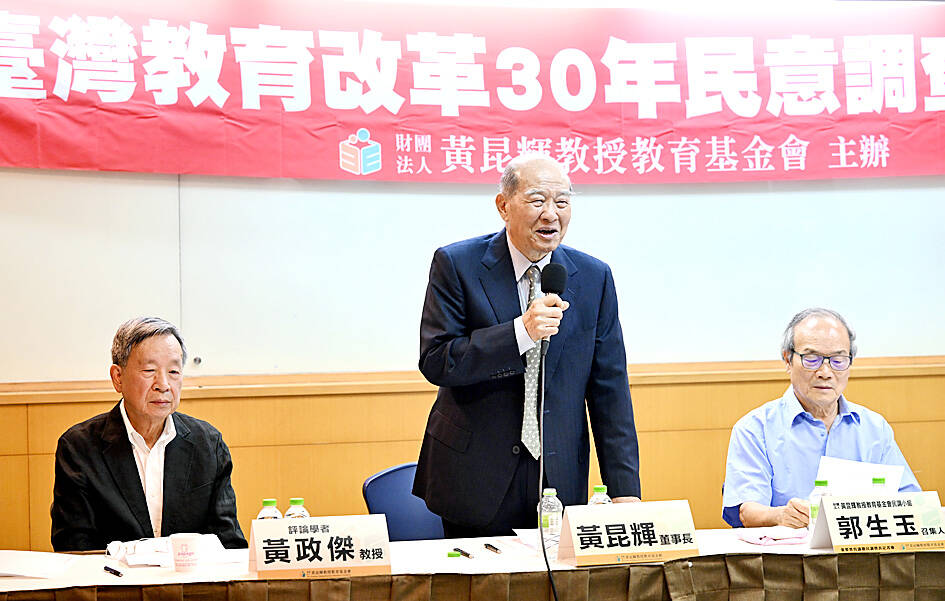About 88 percent of people think the government should call a national conference to discuss education policies, the Professor Huang Kun-huei Education Foundation said yesterday.
In a survey conducted by the foundation, more than half of the respondents said they were not satisfied with the outcomes of the education reform 30 years after the “410 Demonstration for Education Reform” march on April 10, 1994.
The march, staged by nongovernmental groups, prompted the government to set up the Commission on Educational Reform as part of the Executive Yuan.

Photo: Lo Pei-de, Taipei Times
The commission spent two years on research and published The Consultants’ Concluding Report on Education Reform (教育改革總諮議報告書), prompting the education reform, which profoundly influenced the middle-aged and younger generations in Taiwan, foundation chairman Huang Kun-huei (黃昆輝) told a news conference in Taipei.
The survey showed that “providing students with more opportunities to develop personal capabilities and interests” was a crucial positive outcome of the education reform, which earned recognition from 53.3 percent of the respondents, he said.
However, most of the respondents did not find the reform as satisfying in other aspects, he said.
The foundation said that 54.1 percent of the respondents are not satisfied with the reform’s overall outcome, while 51.5 percent are unsatisfied with the decision to open more high schools and universities to reduce academic pressure.
On the other hand, 53.4 percent of the respondents are dissatisfied with the reform’s effectiveness in facilitating social mobility, while 61.2 percent think the reform failed to increase students’ adaptability and competitiveness, and 65 percent are worried about devaluation of college degrees.
About half of the respondents think the reform failed to achieve its goals of “taking care of each student” and “diversifying teachers’ cultivation.”
Meanwhile, about 88 percent of the respondents said that the government should call a national conference on education to discuss policies, while 67 percent agreed that the compulsory education should include five-year-olds, Huang said.
Respondents from Kaohsiung, and Pingtung and Penghu counties are concerned that technical and vocational education is being marginalized, foundation director Feng Ching-huang (馮清皇) said.
Including five-year-old children in compulsory education is the key to providing comprehensive education, foundation poll committee convener Kuo Sheng-yu (郭生玉) said, adding that the National Child Care Policy for Children Ages 0-6 is not enough.
The foundation initiated the discussion about the education reform to unveil the real problems and prepare Taiwan for future education rather than finding someone to blame, Huang said.
Educational groups on April 9, before President William Lai (賴清德) took office, urged him to convene a national conference on education to reach a consensus on policies.
The foundation conducted the nationwide telephone survey among Taiwanese aged 20 or older from May 24 to 27. It had 1,068 valid samples, including 302 via mobile phone, with a margin of error of 3 percentage points, it said.

Three Taiwanese airlines have prohibited passengers from packing Bluetooth earbuds and their charger cases in checked luggage. EVA Air and Uni Air said that Bluetooth earbuds and charger cases are categorized as portable electronic devices, which should be switched off if they are placed in checked luggage based on international aviation safety regulations. They must not be in standby or sleep mode. However, as charging would continue when earbuds are placed in the charger cases, which would contravene international aviation regulations, their cases must be carried as hand luggage, they said. Tigerair Taiwan said that earbud charger cases are equipped

Foreign travelers entering Taiwan on a short layover via Taiwan Taoyuan International Airport are receiving NT$600 gift vouchers from yesterday, the Tourism Administration said, adding that it hopes the incentive would boost tourism consumption at the airport. The program, which allows travelers holding non-Taiwan passports who enter the country during a layover of up to 24 hours to claim a voucher, aims to promote attractions at the airport, the agency said in a statement on Friday. To participate, travelers must sign up on the campaign Web site, the agency said. They can then present their passport and boarding pass for their connecting international

WEATHER Typhoon forming: CWA A tropical depression is expected to form into a typhoon as early as today, the Central Weather Administration (CWA) said yesterday, adding that the storm’s path remains uncertain. Before the weekend, it would move toward the Philippines, the agency said. Some time around Monday next week, it might reach a turning point, either veering north toward waters east of Taiwan or continuing westward across the Philippines, the CWA said. Meanwhile, the eye of Typhoon Kalmaegi was 1,310km south-southeast of Oluanpi (鵝鑾鼻), Taiwan’s southernmost point, as of 2am yesterday, it said. The storm is forecast to move through central

Taiwan sweltered through its hottest October on record, the Central Weather Administration (CWA) said yesterday, the latest in a string of global temperature records. The main island endured its highest average temperature since 1950, CWA forecaster Liu Pei-teng said. Temperatures the world over have soared in recent years as human-induced climate change contributes to ever more erratic weather patterns. Taiwan’s average temperature was 27.381°C as of Thursday, Liu said. Liu said the average could slip 0.1°C by the end of yesterday, but it would still be higher than the previous record of 27.009°C in 2016. "The temperature only started lowering around Oct. 18 or 19